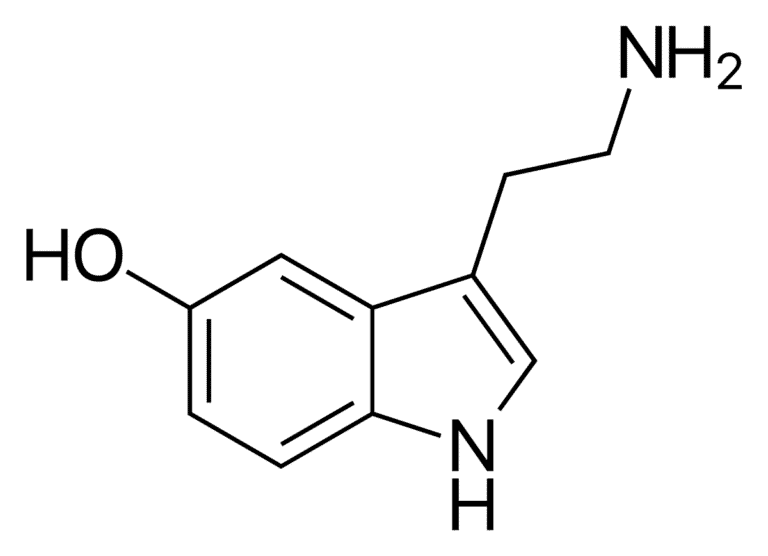TL;DR:
- A massive new study involving tens of thousands of people has concluded that depression is NOT caused by low serotonin levels (as has been the prevailing theory for decades).
- The study shows that “stressful life events” are linked to depression, while serotonin is not.
- Most mainstream media outlets are reporting this as “big news” — but meditators have been reporting since before the dawn of recorded history that the roots of depression are in the mind, not the brain.
In the 1960s, scientists proposed that depression might be caused by low serotonin levels in the brain.
This theory was widely popularized in the 1990s, when SSRI “antidepressants” hit the market. The “serotonin theory of depression” was successfully popularized by drug companies and psychiatrists, and today, antidepressants are a multi-billion-dollar industry.
Well, as it turns out… a massive new study has demonstrated conclusively that the serotonin theory of depression is simply incorrect.
A massive, groundbreaking “umbrella” study was released this week in the journal Molecular Psychiatry, reviewing the scientific research that has been done up until now.
Researchers from University College London analyzed studies that looked at serotonin levels in thousands of individuals, and found that there was no correlation between serotonin levels and depression.
The researchers also reviewed studies in which serotonin levels were intentionally reduced in the study participants (to see what would happen). They found that this intentional reduction in serotonin did not produce depression in the hundreds of study participants.
While most scientific research produces mild conclusions, with uncertain statements from the researchers, this study’s conclusions were crystal clear.
To quote the study itself:
The idea that depression is the result of abnormalities in brain chemicals, particularly serotonin… has been influential for decades, and provides an important justification for the use of antidepressants.
Surveys suggest that 80% or more of the general public now believe it is established that depression is caused by a ‘chemical imbalance.’ Many general practitioners also subscribe to this view and popular websites commonly cite the theory.
Despite the fact that the serotonin theory of depression has been so influential, no comprehensive review has yet synthesised the relevant evidence. We conducted an ‘umbrella’ review of the principal areas of relevant research… We sought to establish whether the current evidence supports a role for serotonin in the aetiology of depression, and specifically whether depression is associated with indications of lowered serotonin concentrations or activity.
Our comprehensive review of the major strands of research on serotonin shows there is no convincing evidence that depression is associated with, or caused by, lower serotonin concentrations or activity. Most studies found no evidence of reduced serotonin activity in people with depression compared to people without, and methods to reduce serotonin availability using tryptophan depletion do not consistently lower mood in volunteers.
The chemical imbalance theory of depression is still put forward by professionals. The general public widely believes that depression has been convincingly demonstrated to be the result of serotonin or other chemical abnormalities, and this belief shapes how people understand their moods, leading to a pessimistic outlook on the outcome of depression and negative expectancies about the possibility of self-regulation of mood. The idea that depression is the result of a chemical imbalance also influences decisions about whether to take or continue antidepressant medication and may discourage people from discontinuing treatment, potentially leading to lifelong dependence on these drugs.”
Moncrieff, J., Cooper, R.E., Stockmann, T. et al. The serotonin theory of depression: a systematic umbrella review of the evidence. Mol Psychiatry (2022). https://doi.org/10.1038/s41380-022-01661-0
The lead author of the study, professor Joanna Moncrieff, concluded: “After a vast amount of research conducted over several decades, there is no convincing evidence that depression is caused by serotonin abnormalities, particularly by lower levels or reduced activity of serotonin.”
So, if depression is NOT caused by a chemical imbalance, then what IS it caused by?
The one thing that the researchers did find to be positively correlated with depression was stressful life events… an external factor, not a biological one.
So, does that mean that depression is caused by stressful life events?
And if so, what would be the cure? How would we treat depression, if it is caused by stressful events, rather than brain chemicals?
The authors of the study do not mince words about anti-depressants:
Patients should not be told that depression is caused by low serotonin or by a chemical imbalance, and they should not be led to believe that antidepressants work by targeting these unproven abnormalities.
We do not understand what antidepressants are doing to the brain exactly, and giving people this sort of misinformation prevents them from making an informed decision about whether to take antidepressants or not.
It is often assumed that the effects of antidepressants demonstrate that depression must be at least partially caused by a brain-based chemical abnormality, and that the apparent efficacy of SSRIs shows that serotonin is implicated.
Other explanations for the effects of antidepressants have been put forward, however, including the idea that [antidepressants] work via an amplified placebo effect or through their ability to restrict or blunt emotions in general.
Moncrieff, J., Cooper, R.E., Stockmann, T. et al. The serotonin theory of depression: a systematic umbrella review of the evidence. Mol Psychiatry (2022). https://doi.org/10.1038/s41380-022-01661-0
Well then, if this study holds up, and depression is caused by “stressful life events” rather than chemical imbalances, and antidepressants are not the answer… then what should we do to treat depression?
For millennia, meditators have been diving into their inner worlds, and reporting back that the real roots of anxiety & depression are in the mind. It follows that we can only effectively address mental conditions by working with the mind.
Meditation techniques have been practiced since before the dawn of recorded history, to help us deal with the “stressful life events” (and the anxiety, depression and dukkha) that inevitably befall us all.
When we encounter “stressful life events,” and difficult emotions, we can respond by numbing ourselves to the pain and falling into a deep well of depression… OR we can experience the full range of joy, bliss, pain, and sadness that life has to offer, while still remaining in an overarching state of peace, love, and equanimity.
Through meditation, we can experience all of our emotions, arising and passing away in the present moment… instead of holding on to them, getting stuck in them, and letting them drag us down into maladaptive states of anxiety and depression.
Meditation is the actual cure for depression (and anxiety). It addresses depression and anxiety at the root, in the mind.
Meditators have been reporting this for millennia, and scientific studies have been corroborating that meditation can effectively reduce depression for decades as well.
The mistaken belief that “depression is caused by a chemical imbalance” impedes peoples’ confidence and motivation to heal themselves through natural means like meditation.
I often hear people say (generally with a tone of anger and indignation): “You can’t treat depression through meditation… it’s a chemical imbalance!”
People have been using the idea that “depression is caused by a chemical imbalance” for decades, as an excuse to avoid confronting their own feelings and working through them naturally, through reflection, introspection, and meditation.
Well… science has moved on. Hopefully society (and its discontents) will too.
It’s time to stop running.
If you want to learn more about how to apply meditation in your own life, to become a happier and healthier human being, please feel free to check out my online meditation courses, or subscribe to Meditation Magazine.








… [Trackback]
[…] Find More on to that Topic: meditationmag.com/blog/depression-not-caused-by-chemical-imbalance/ […]
… [Trackback]
[…] There you will find 33179 more Info on that Topic: meditationmag.com/blog/depression-not-caused-by-chemical-imbalance/ […]
… [Trackback]
[…] Find More on on that Topic: meditationmag.com/blog/depression-not-caused-by-chemical-imbalance/ […]
… [Trackback]
[…] Read More on that Topic: meditationmag.com/blog/depression-not-caused-by-chemical-imbalance/ […]
… [Trackback]
[…] Info to that Topic: meditationmag.com/blog/depression-not-caused-by-chemical-imbalance/ […]
… [Trackback]
[…] Find More here to that Topic: meditationmag.com/blog/depression-not-caused-by-chemical-imbalance/ […]
… [Trackback]
[…] Read More Information here to that Topic: meditationmag.com/blog/depression-not-caused-by-chemical-imbalance/ […]
… [Trackback]
[…] Find More on on that Topic: meditationmag.com/blog/depression-not-caused-by-chemical-imbalance/ […]
… [Trackback]
[…] Read More to that Topic: meditationmag.com/blog/depression-not-caused-by-chemical-imbalance/ […]
… [Trackback]
[…] Information on that Topic: meditationmag.com/blog/depression-not-caused-by-chemical-imbalance/ […]
… [Trackback]
[…] Read More to that Topic: meditationmag.com/blog/depression-not-caused-by-chemical-imbalance/ […]
… [Trackback]
[…] There you will find 57220 more Information to that Topic: meditationmag.com/blog/depression-not-caused-by-chemical-imbalance/ […]
… [Trackback]
[…] Read More on to that Topic: meditationmag.com/blog/depression-not-caused-by-chemical-imbalance/ […]
… [Trackback]
[…] Find More here to that Topic: meditationmag.com/blog/depression-not-caused-by-chemical-imbalance/ […]
… [Trackback]
[…] Read More to that Topic: meditationmag.com/blog/depression-not-caused-by-chemical-imbalance/ […]
… [Trackback]
[…] Read More Info here on that Topic: meditationmag.com/blog/depression-not-caused-by-chemical-imbalance/ […]
… [Trackback]
[…] Find More to that Topic: meditationmag.com/blog/depression-not-caused-by-chemical-imbalance/ […]
… [Trackback]
[…] Info to that Topic: meditationmag.com/blog/depression-not-caused-by-chemical-imbalance/ […]
… [Trackback]
[…] Find More on that Topic: meditationmag.com/blog/depression-not-caused-by-chemical-imbalance/ […]
… [Trackback]
[…] Info to that Topic: meditationmag.com/blog/depression-not-caused-by-chemical-imbalance/ […]
… [Trackback]
[…] Info to that Topic: meditationmag.com/blog/depression-not-caused-by-chemical-imbalance/ […]
… [Trackback]
[…] Info on that Topic: meditationmag.com/blog/depression-not-caused-by-chemical-imbalance/ […]
… [Trackback]
[…] There you can find 90634 more Information on that Topic: meditationmag.com/blog/depression-not-caused-by-chemical-imbalance/ […]
… [Trackback]
[…] Find More here to that Topic: meditationmag.com/blog/depression-not-caused-by-chemical-imbalance/ […]
… [Trackback]
[…] Info on that Topic: meditationmag.com/blog/depression-not-caused-by-chemical-imbalance/ […]